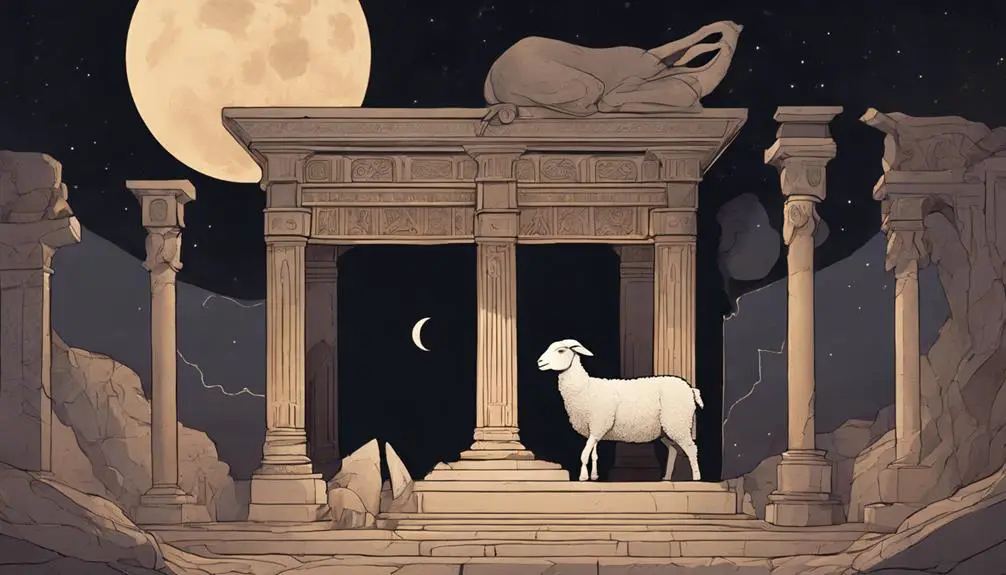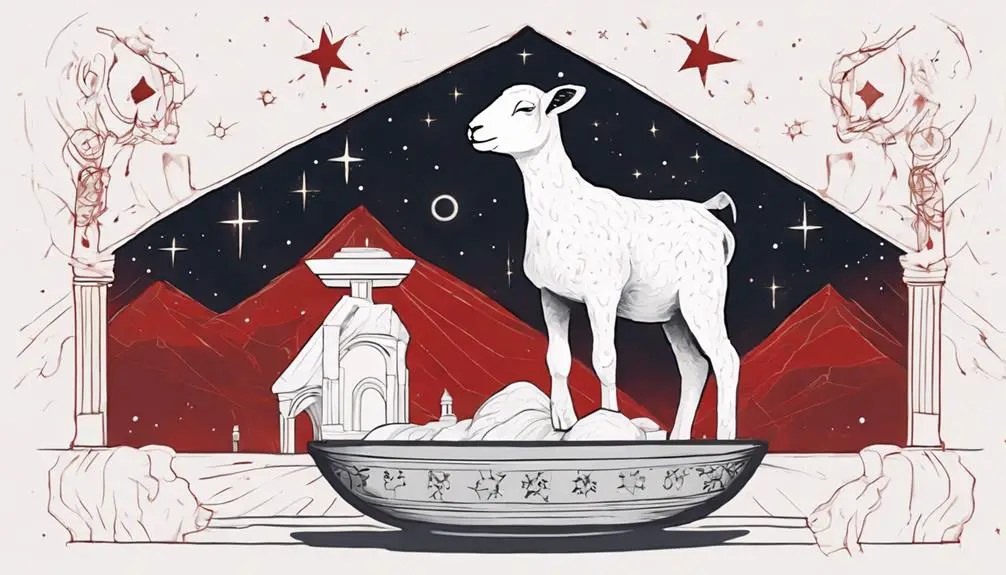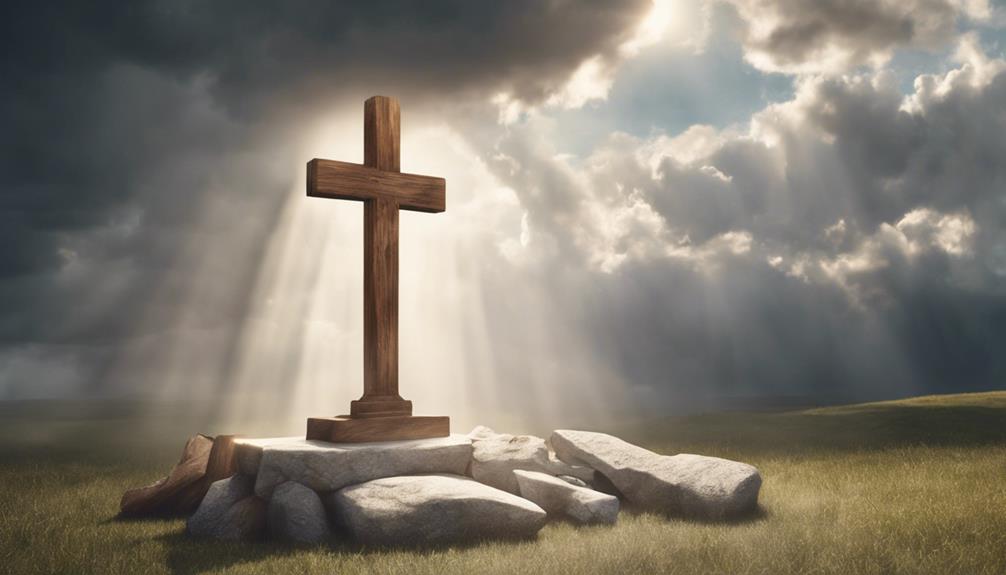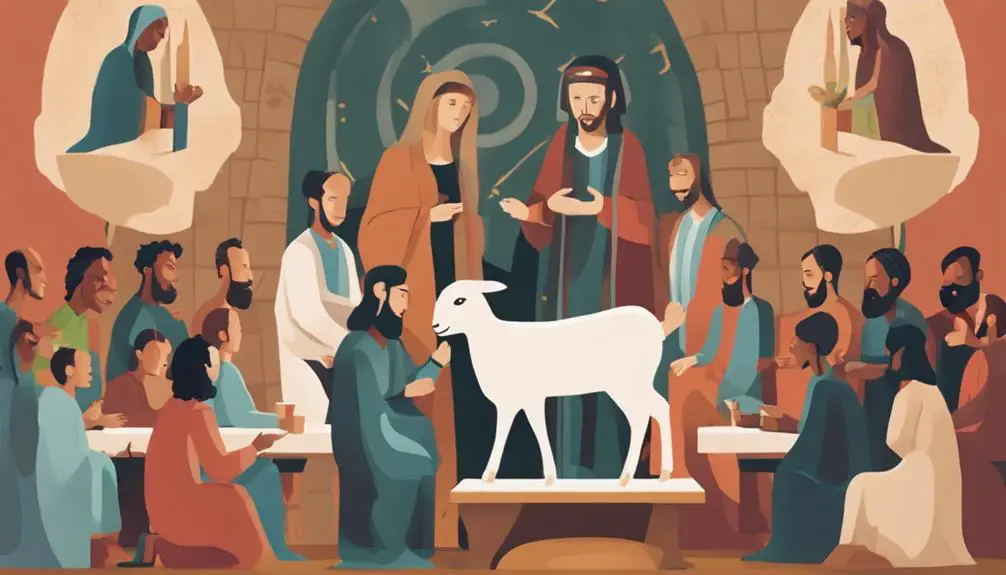Yield to the profound symbolism of blood sacrifice in the Bible, uncovering ancient rituals that shape modern faith and provoke thought.

Blood Sacrifice in the Bible
You've probably heard theories suggesting that blood sacrifice in the Bible is rooted in ancient practices, but have you considered the depth of its symbolism and significance?
From its origins to the transition into the New Covenant, these rituals offer a complex understanding of faith, atonement, and covenant between humanity and the divine.
Exploring major biblical incidents and modern debates sheds light on how these ancient customs influence contemporary beliefs and practices.
By investigating further, you'll uncover layers of meaning that may challenge or enrich your understanding of this profound element of faith.
Key Takeaways
- Blood sacrifices were integral to ancient religious practices for atonement and purification.
- The symbolism of blood sacrifice includes sealing covenants and expressing devotion to the divine.
- Jesus' crucifixion is seen as the ultimate blood sacrifice, fulfilling the Old Covenant and establishing a New Covenant.
- Modern interpretations of blood sacrifice emphasize metaphorical significance and ethical considerations.
Origins and Early Practices

Tracing back to ancient times, blood sacrifice emerged as a pivotal religious practice among early civilizations, profoundly influencing the rituals and beliefs documented in the Bible. As you delve into this subject, it's essential to consider the cultural comparisons and ritual variations that distinguish these practices across different societies.
In examining the origins and early practices of blood sacrifice, you'll find that these acts weren't monolithic. Instead, they varied significantly from one culture to another, reflecting the diverse ways in which societies sought to connect with the divine or supernatural realms. For example, while some civilizations offered blood sacrifices to appease gods or spirits, others saw them as essential for the renewal of the land or the community's well-being.
This diversity in practice underscores the complexity of understanding blood sacrifice solely through a biblical lens. The ritual variations, including the choice of sacrifice (ranging from animals to, in extreme cases, humans), the method of sacrifice, and the accompanying ceremonies, offer a rich tapestry of religious expression. These differences not only highlight the adaptability and significance of blood sacrifice in ancient religious practice but also challenge you to appreciate the nuanced ways in which these rituals were integrated into the social and spiritual fabric of early civilizations.
Symbolism and Significance

Delving into the symbolism and significance of blood sacrifice in ancient cultures reveals a complex web of meanings that transcended mere ritualistic practices, embodying profound connections between the community, the divine, and the cosmos itself. These sacrifices weren't just about the act of offering; they were deeply embedded in the fabric of society, reflecting both cultural influences and psychological impacts.
- Atonement and Purification: Blood sacrifice often symbolized the cleansing of a community or individual, purifying them of sins or impurities.
- Covenant and Agreement: It served as a physical sign of contracts or covenants between humans and the divine, sealing promises with the gravity of life itself.
- Fertility and Abundance: The shedding of blood was believed to ensure fertility of the land, invoking divine favor for bountiful harvests.
- Transition and Transformation: Blood rites marked significant transitions, embodying the passage from one state of being to another, often from life to death to rebirth.
- Communal and Personal Identity: Such rituals reinforced community bonds and individual identities, situating each within a larger cosmic narrative.
These multifaceted practices underscore how blood sacrifice functioned not merely as religious observance but as a pivotal channel through which ancient peoples navigated their existence, intertwining cultural, psychological, and spiritual dimensions.
Major Biblical Incidents

Exploring the Bible reveals a series of notable incidents where blood sacrifice played a critical role, illustrating its profound importance in biblical narratives and theology. Two major incidents stand out: Abraham's test and the Passover event. These episodes not only underscore the significance of blood sacrifice but also offer deep insights into the relationship between God and His people.
Incident |
Context |
Significance |
|---|---|---|
Abraham's Test |
God tests Abraham's faith by asking him to sacrifice his son, Isaac. |
Demonstrates faith and obedience; a symbolic precursor to the ultimate sacrifice in Christian theology. |
Passover Event |
The Israelites mark their doorposts with lamb's blood to be spared from the plague. |
Symbolizes deliverance and protection; foundational to the celebration of Passover in Jewish tradition. |
Abraham's willingness to sacrifice Isaac, though God ultimately provided a ram as a substitute, highlights the depth of faith and the concept of substitutionary atonement. The Passover event, with the blood of the lamb serving as a sign for the Israelites' salvation from death, establishes a profound theological foundation for the theme of redemption and deliverance. These incidents, rich in symbolism and theological significance, are pivotal in understanding the role and perception of blood sacrifice in biblical times.
Transition to the New Covenant

Historically, the transition to the New Covenant marks a pivotal shift in the understanding and practice of blood sacrifice within biblical theology. This change reflects a deeper, more inclusive covenant theology, emphasizing faith and grace over the physical acts of sacrifice that predominated the Old Covenant. You'll find this transition underscores several key developments:
- The role of Jesus' sacrifice as fulfilling and surpassing the Old Covenant sacrifices.
- A shift from physical to spiritual purification, emphasizing internal transformation over external rituals.
- The inclusion of Gentiles, breaking down the barriers that once separated the Jewish people from the rest of the world in terms of covenantal promises.
- A redefinition of the community of God's people, focusing on faith in Christ rather than adherence to the Mosaic Law.
- The establishment of a new priesthood, with Jesus as the eternal high priest, mediating a better covenant between God and humanity.
These shifts highlight a radical reconfiguration in the relationship between God and humanity. They pivot around the inclusion of Gentiles into covenantal promises, significantly broadening the scope of who's considered God's people and how they relate to Him, all while maintaining a continuity with the foundational principles of covenant theology.
Modern Interpretations and Debates

How do contemporary scholars interpret the theological significance of blood sacrifice in the context of modern Christianity, and what debates arise from these interpretations?
You find that opinions are varied, reflecting a spectrum of theological perspectives. Some scholars view blood sacrifice through a historical lens, emphasizing its role in ancient rituals and its transformation in Christian symbolism. They argue that understanding the sacrificial practices of the past can shed light on the profound theological themes of redemption and covenant in Christianity.
However, this interpretation isn't without its ethical controversies. A significant debate centers on the moral implications of blood sacrifice imagery in religious texts. Critics question the ethicality of glorifying sacrificial acts, suggesting it could perpetuate harmful ideologies or justify violence. This concern highlights the tension between traditional interpretations and modern ethical standards.
Additionally, the cultural impacts of blood sacrifice concepts in contemporary society are scrutinized. Scholars debate how these ancient rituals influence present-day Christian practices and beliefs, and whether they foster a sense of community or division. This discourse not only enriches our understanding of religious symbolism but also invites a reevaluation of how ancient practices are integrated and interpreted in modern faith contexts.
Frequently Asked Questions
How Do Current Archaeological Findings Support or Refute the Historical Accuracy of Biblical Blood Sacrifices?
You're asking if archaeological findings back up or dispute historical accounts of sacrifices. Current evidence, including sacrificial artifacts, suggests some practices were historically accurate. These items, with clear ritual significance, align with descriptions in various texts.
However, the debate isn't settled. While some findings support these accounts, others argue they're not definitive proof of the specific ceremonies described.
Your inquiry taps into a complex field where archaeology and ancient texts intersect, offering intriguing insights.
In What Ways Have Non-Biblical Cultures Around the World Practiced Similar Forms of Blood Sacrifice, and What Are the Parallels and Differences With the Biblical Accounts?
You're exploring how cultures worldwide have engaged in sacrificial rituals, reflecting a shared human tradition. These practices show cultural similarities, yet differ in purposes and entities honored.
While some cultures aimed to appease gods or ancestors, others sought to ensure fertility or victory in battle. Comparing these to biblical accounts reveals both parallels in the act of sacrifice and differences in the specifics of the rituals and the symbolism attributed to the act.
How Have Different Christian Denominations Reconciled the Concept of Blood Sacrifice With Modern Ethical Considerations About Animal Rights and Welfare?
You're exploring how Christian denominations navigate animal ethics within the frame of modern ritualism. They've sought a balance, often prioritizing symbolic acts over literal blood sacrifices to align with contemporary views on animal welfare.
This reconciling process involves theological reinterpretations, emphasizing spiritual sacrifice over physical. By doing so, they maintain doctrinal integrity while respecting modern ethical standards, showcasing a nuanced approach to integrating ancient traditions with today's moral considerations.
Are There Any Documented Psychological Effects on Individuals or Communities That Engaged in Blood Sacrifices, According to Historical Records or Contemporary Studies?
You're asking if historical records or contemporary studies document psychological effects on those involved in blood sacrifices. Research indicates that participants may experience psychological trauma. This trauma can stem from direct involvement in the act or witnessing it.
Cultural adaptation plays a crucial role in how communities process and integrate these practices into their collective psyche. Over time, societies have developed mechanisms to reconcile these practices with evolving ethical standards, reflecting on their impact on mental health.
How Have Contemporary Artists, Writers, and Filmmakers Interpreted or Reimagined the Concept of Blood Sacrifice in the Bible in Their Works?
In exploring how contemporary artists, writers, and filmmakers have reimagined the concept of sacrifice, you'll find a rich tapestry of cinematic symbolism and literary adaptations. They've delved deep into themes of redemption, loss, and rebirth, often drawing parallels to ancient rituals but placing them in modern contexts.
This creative reinterpretation serves not only as a critique of societal norms but also as a reflection on the human condition, making ancient narratives resonate today.
Conclusion
In summarizing, it's evident that blood sacrifice in the Bible, transitioning from ancient rites to the New Covenant, holds profound symbolism. It's not merely an act of faith but a reflection of deeper theological themes, such as redemption and covenant.
Modern debates continue to explore its relevance and interpretation, challenging believers and scholars alike to reconsider its implications. This ongoing dialogue underscores the enduring complexity and significance of blood sacrifice within the broader narrative of Biblical theology and human spirituality.



Sign up